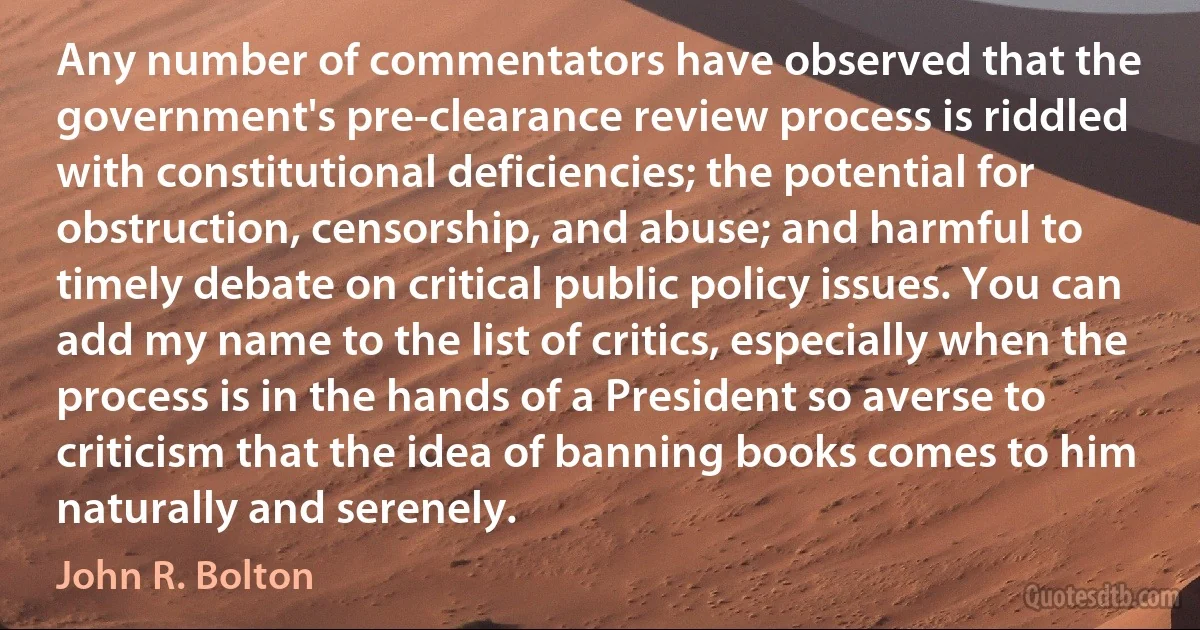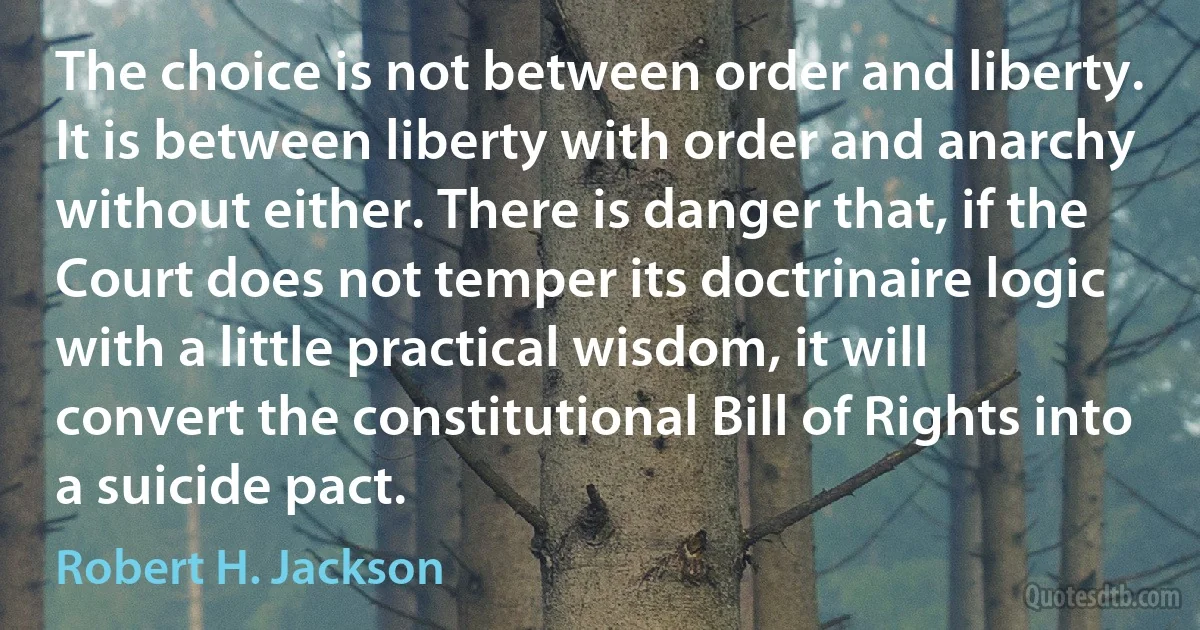Constitutional Quotes - page 22
With respect to the Reform Bill itself, I will repeat now the declaration I made when I entered the House of Commons as a member of the Reformed Parliament-that I consider the Reform Bill a final and irrevocable settlement of a great constitutional question-a settlement which no friend to the peace and welfare of this country would attempt to disturb, either by direct or by insidious means.

Robert Peel
In the past, there was no freedom, so we struggled to get freedom. In the past, we were oppressed by the political system, so we opposed the system. But today's Taiwan is a democratic nation. Besides seeking freedom, we must also consolidate the rule of law, accept the responsibilities associated with that, and work together to sustain our system of democratic, constitutional government.

Chen Shui-bian
He [Ambedkar] was quite clear that Muslims proposed to hold to their demands for 50:50 and so gradually lay the foundation of Pakistan, and he was perfectly content himself, he said, with that state of things, and in favour of the Pakistan idea quite frankly because it meant the British would have to stay in India. He saw not the least prospect of our overcoming difficulties here by guarantees of any sort and (like most minorities) he has, I suspect, little interest in constitutional progress....

Bhimrao Ramji Ambedkar
Some people view the public domain with contempt. In their brief before the Supreme Court, the Nashville Songwriters Association wrote that the public domain is nothing more than "legal piracy." But it is not piracy when the law allows it; and in our constitutional system, our law requires it. Some may not like the Constitution's requirements, but that doesn't make the Constitution a pirate's charter.
As we've seen, our constitutional system requires limits on copyright as a way to assure that copyright holders do not too heavily influence the development and distribution of our culture. Yet, as Eric Eldred discovered, we have set up a system that assures that copyright terms will be repeatedly extended, and extended, and extended. We have created the perfect storm for the public domain. Copyrights have not expired, and will not expire, so long as Congress is free to be bought to extend them again.

Lawrence Lessig
When I joined the military, some 50 years ago, I swore an oath to support and defend the Constitution. Never did I dream that troops taking that same oath would be ordered under any circumstance to violate the Constitutional rights of their fellow citizens - much less to provide a bizarre photo op for the elected commander-in-chief, with military leadership standing alongside.

James Mattis
I was democratically elected leader of our party for a new kind of politics by 60% of Labour members and supporters, and I will not betray them by resigning. Today's vote by MPs has no constitutional legitimacy. We are a democratic party, with a clear constitution. Our people need Labour Party members, trade unionists and MPs to unite behind my leadership at a critical time for our country.

Jeremy Corbyn
I have long ago made a final and irrevocable decision. Nothing and no one, no pressure, cither from the right or from the left, will make me abandon the positions of perestroika and new thinking. I do not intend to change my views or convictions. My choice is a final one.
It is my profound conviction that the problems arising in the course of our transformations can be solved solely by constitutional means. That is why I make every effort to keep this process within the confines of democracy and reforms.

Mikhail Gorbachev
...we are a party dedicated to the rule of law and to parliamentary democracy. What the law says, even if we don't like it, is what we have to accept until we can change it by constitutional means. No one is entitled to be above the law. If we weaken on that principle we can say goodbye to democratic socialism, because what is sauce for the goose will be sauce for the gander, and there are plenty of right-wing elements who if given the excuse would gain momentum in defying future measures of social progress which they would not like. That is and will be my policy as long as I am at the Home Office.

Roy Jenkins
...the basic fact of Tony Blair's election does make it, in my view, the most exciting Labour choice since the election of Hugh Gaitskell in December 1955. ... The most fundamental presentation issue for the Labour Party is one of openness or inwardness. Nothing does the party more harm than when it turns in on itself in a mood of proletarian sullenness. Tony Blair epitomises the reverse of this. ... I hope he will use this opportunity in favour of sticking to a constructive line on Europe, in favour of sensible constitutional innovation...and in favour of friendly relations with the Liberal Democrats. ... I hope Mr Blair will not lead the Labour Party further in a free-market direction. Good work has been done in freeing it from nationalisation and other policies. But the market cannot solve everything and it would be a pity to embrace the stale dogmas of Thatcherism just when their limitations are becoming obvious.

Roy Jenkins
President Trump claims the election was stolen.
The assertions range from specific local allegations to constitutional arguments to sweeping conspiracy theories.
I supported the president's right to use the legal system. Dozens of lawsuits received hearings in courtrooms all across our country, but over and over, the courts rejected these claims, including all-star judges whom the president himself has nominated.

Mitch McConnell
There is no constitutional or legal requirement that the President shall take the oath of office in the presence of the people, but there is so manifest an appropriateness in the public induction to office of the chief executive officer of the nation that from the beginning of the Government the people, to whose service the official oath consecrates the officer, have been called to witness the solemn ceremonial. The oath taken in the presence of the people becomes a mutual covenant. The officer covenants to serve the whole body of the people by a faithful execution of the laws, so that they may be the unfailing defense and security of those who respect and observe them, and that neither wealth, station, nor the power of combinations shall be able to evade their just penalties or to wrest them from a beneficent public purpose to serve the ends of cruelty or selfishness.

Benjamin Harrison
Is it not quite possible that the farmers and the promoters of the great mining and manufacturing enterprises which have recently been established in the South may yet find that the free ballot of the workingman, without distinction of race, is needed for their defense as well as for his own? I do not doubt that if those men in the South who now accept the tariff views of Clay and the constitutional expositions of Webster would courageously avow and defend their real convictions they would not find it difficult, by friendly instruction and cooperation, to make the black man their efficient and safe ally, not only in establishing correct principles in our national administration, but in preserving for their local communities the benefits of social order and economical and honest government. At least until the good offices of kindness and education have been fairly tried the contrary conclusion can not be plausibly urged.

Benjamin Harrison
For nothing whatever but the constitutional law, the political structure, of these United States protects any American from arbitrary seizure of his property and his person, from the Gestapo and the Storm Troops, from the concentration camp, the torture chamber, the revolver at the back of his neck in a cellar. I am not an alarmist; that is plain fact.

Rose Wilder Lane
During the American Constitutional Convention, just before the convention, there was in Hartford, Conn., one day a storm which overcast the United States, and in that religious day men fell on their knees and begged a final blessing before the end came. The Connecticut House of Representatives was in session and many of the members clamored for immediate adjournment. The speaker of the house, one Colonel Davenport, came to his feet and he silenced the din with these words: "The day of judgment is either approaching or it is not. If it is not, there is no cause for adjournment. If it is, I choose to be found doing my duty. I wish, therefore, that candles may be brought."
I hope in a dark and uncertain period in our own country that we, too, may bring candles to help light our country's way.

Abraham Davenport
In our hearing tonight, you saw an American president faced with a stark, unmistakable choice between right and wrong. There was no ambiguity, no nuance. Donald Trump made a purposeful choice to violate his oath of office, to ignore the ongoing violence against law enforcement, to threaten our Constitutional order. There is no way to excuse that behavior. It was indefensible.
And every American must consider this: Can a president who is willing to make the choices Donald Trump made during the violence of January 6th ever be trusted with any position of authority in our great nation again?

Elizabeth Cheney
This idea, though not incorporated in the constitution, was the prevailing idea at that time. The constitution, it is true, secured every essential guarantee to the institution while it should last, and hence no argument can be justly urged against the constitutional guarantees thus secured, because of the common sentiment of the day. Those ideas, however, were fundamentally wrong. They rested upon the assumption of the equality of races. This was an error. It was a sandy foundation, and the government built upon it fell when the 'storm came and the wind blew'.

Alexander H. Stephens
Temperament refers to the mode of reaction and is constitutional and not changeable; character is essentially formed by a person's experiences, especially of those in early life, and changeable, to some extent, by insights and new kinds of experiences. If a person has a choleric temperament, for instance, his mode of reaction is "quick and strong.” But what he is quick or strong about depends on his kind of relatedness, his character. If he is a productive, just, loving person he will react quickly and strongly when he loves, when he is enraged by injustice, and when he is impressed by a new idea. If he is a destructive or sadistic character, he will be quick and strong in his destructiveness or in his cruelty. The confusion between temperament and character has had serious consequences for ethical theory. Preferences with regard to differences in temperament are mere matters of subjective taste. But differences in character are ethically of the most fundamental importance.

Erich Fromm



